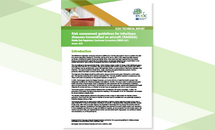Risk assessment guidelines for infectious diseases transmitted on aircraft (RAGIDA) - Middle East Respiratory Syndrome Coronavirus (MERS-CoV)
The Middle East respiratory syndrome coronavirus (MERS-CoV) was first discovered in 2012 in a patient who died from severe respiratory disease. Since then, and as of 16 January 2020, 2 521 cases have been reported worldwide, including 919 deaths (crude case fatality 36%). Most cases have been reported from the Arabian Peninsula (and around 84% specifically from Saudi Arabia), and all cases elsewhere had a travel history to the Arabian Peninsula or were a contact of someone who had a travel history to the region.
Executive Summary
These Risk Assessment Guidelines for Infectious Diseases transmitted on Aircraft (RAGIDA) are to assist public health authorities in decision making regarding contact tracing when a case of MERS-CoV is found to have been travelling on an aircraft. A systematic review was performed from January to May 2019, after which an expert meeting was organised in November 2019 to discuss the scientific basis for public health measures. Participants of the expert panel were selected from public health experts with experience in the investigation and follow-up of cases and MERS-CoV experts, as well as experts from the aviation sector, the medical evacuation field, and representatives of ECDC and the World Health Organization. No conflicts of interest were declared by any of the participants.







